London 2012: Chain reaction - how cycling went mainstream
- Published
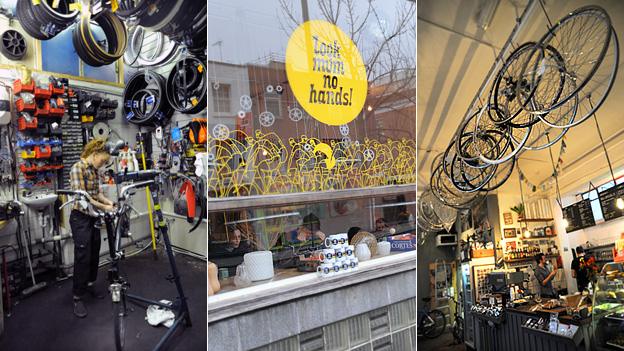
Look Mum No Hands! was founded to fulfil a need for somewhere to watch the Tour de France when pubs showed only football
On the start line of the Olympic Velodrome track, the three riders of the GB women's team pursuit are hunched over their handlebars, ready to go.
It's hot, 28 degrees Celsius under the large, bright white lights strung out across the span of the "Pringles" roof.
Laura Trott, external, Wendy Houvenaghel and Jo Rowsell are about to make Britain's debut here, at this round of track cycling's World Cup and the venue'stest event for the London 2012 Games.
They loop around the £105m venue, coming within touching time of the world record to qualify in second place.
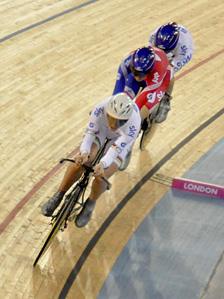
GB women compete in the team pursuit at the Olympic Velodrome
The rumble of bikes on the brand new Siberian pine surface and the whooping from the crowd tingles the spine.
"Wow," says Paul Webb, who has brought his son Ben, 11, from Plymouth to see sport in a Games venue. "When this is an Olympic final, it really will be some feeling."
The spectators here are a self-selecting crew of fans and weekend cyclists.
But, on the sofa, out on the road, even on the track, they are joined by increasing numbers of fellow Britons.
It is not just 2011 world champion and Tour de France green jersey wearerMark Cavendish winning Sports Personality of the Yearthat shows cycling has shifted up a gear and become mainstream.
Membership of the sport's national bodyBritish Cycling, external, charged with developing it in England and looking after the GB squad, has risen by 70% since the start of the four-year Olympic cycle in April 2009 - from 25,800 to 43,000.
It wants to make the most of any boost from the 2012 Games, to deliver themuch-talked about legacy, externalthrough participation. It aims for 100,000 members by 2013.
And its demographic shows scope to broaden membership beyond the "Mamils" - middle aged men in lycra. Current membership is 86% male and most, 56%, are aged 31-54.
Take an innocent-looking Tuesday in a café in east London's Old Street and it seems everyone has saddled-up and joined the ranks.
Look Mum No Hands!, externalwas founded by Matt Harper and two racing friends in 2010 to fulfil their need for somewhere to watch the Tour de France when pubs showed only football.
Now it's turning a healthy profit in hard times, looking to expansion, and is a hub for cyclists and the industry.
"We thought why not a coffee shop and a bike shop where you can watch live sport and have a glass of wine?" says Matt.
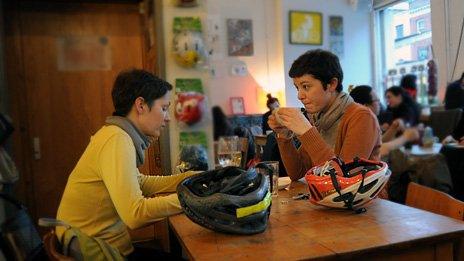
The cafe's afternoon student crowd gives way to the rush hour cyclists meeting for coffee or waiting on repairs
"This wouldn't have worked five years ago but we caught the right moment when cycling was gaining momentum and it's taken on its own life.
"It's not a fashion that'll go away - once people start cycling they are not going to stop.
"It's something you can use every day - as (Scottish cyclist)Graeme Obree, externalsays, 'You can't football down the shops'."
The venue, part bar-and-tables, part bike repair workshop, is packed as students from nearby City University give way to arriving cyclists - some in lycra, some fixie-riders in skinny tops, business couriers, commuters, racers.
There are people who tutor bike safety courses; members of theLondon Fixed Gear and Single Speed Forum, external; women commuters who have built their own bikes.
Most are here to watch or tryRollapaluza, external- a roller-racing outfit touring the UK to find the fastest cyclist over 500m on a fixed bike.
It is a remnant from another golden age of cycling, 1950s Britain, when fans on their own bikes flocked to the stands at velodromes and whenroller races, externaltook place in dance halls or during cinema intermissions.

The "fully functioning 'uber' workshop" can do many repairs on the same day
Now it has been pimped for a new generation. The DJ is on it, lights are flashing as two cyclists go head-to-head.
Caspar Hughes has been running this and his other cycling events as a profitable full-time job since 2007, for corporate clients, schools, and cycling bodies.
He's had everyone on the bikes from the "Hoys and Pendletons to a 68-year-old woman who'd had a double hip replacement". And he wonders how he'll cope with demand in the "perfect storm" of the Olympic year.
Cav factor
Figures from industry watcher BikeBiz, externalput the value of the cycling market in 2010 at more than £2.1bn. It's projected to reach the £3bn mark by 2015.
Journeys on the National Cycle Network wereup 13% in 2010 on the previous year, externalwith almost 3 million riders.
BikeBiz's Mark Sutton says the sector has been touted as recession proof. "People look for cheaper travel during difficult financial times, cycling is the obvious choice," he says.
"Five or six tanks worth of petrol will buy you a bike that'll last several years with proper care."
Also pulling a wheelie in the face of the downturn is Andrew Straw, ofSkedaddle, external, his jointly-owned cycle holiday company that has grown from a bedroom start-up in 1996 to having 10 office staff and guides around the world taking 2,500 people away each year.
For him, the Cav factor is clear - while Cavendish rides a stage of the Tour, website bookings go dead. But in the immediate aftermath demand "surges" like a final sprint.
Road cycling bookings were up 40% in the Manxman's world championship-winning year, and by another 40% in January 2011, their highest-ever sales month.
There has also been a "massive" increase in leisure breaks sales, from families who increasingly want to do something more than a beach holiday.
"We were wondering what would happen to tourism in the recession," Andrew says. "But we're bucking the trend.
"We're on the crest of a wave with cycling at the forefront of people's minds."
Ask cyclists, industry figures and commentators to explain the reason for the rise in cycling and the answers range wide.
It's cheaper transport for straitened times; recapturing childhood freedoms; fitness and spin class; accessibility and convenience; the fallout from the 7/7 London bombings; that the image now is less high-vis and helmet hair;Boris bikes, externalandcycle superhighways, external;Sky rides, external;Sustrans, externaland theNational Cycle Network, external.
They also point the finger at the heroes of cycling, including those currently shooting hell for leather out of the steeply banked curves of the Olympic Velodrome.
Cycling Weekly writer Nick Bull pinpoints themoment when Jason Queally won gold in the 1km time trial at the Sydney 2000 Olympics, externalas a tipping point.
"From there it's been a snowball effect," he says. "With success in Athens four years later and since Beijing, it's been unprecedented.
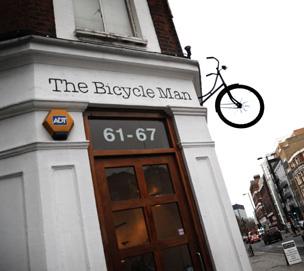
The rise in cycling has helped many businesses prosper
What is agreed is that the safety aspect for cyclists has not been resolved. If therisks to limb on the veldrome track, externalorroad race, externalare obvious, the risks to life on the road are stark.
Thelatest Department for Transport figures, externalshow 3,000 pedal cyclists were KSI - killed or seriously injured - in the 12 months ending September 2011, up 8% on the previous year and 19% up on the 2005-9 average.
A further 15,200 were slightly injured, up 3% on the year to September 2010 and up 9% on the 2005-9 average.
This compares with 9,420 of all car users KSI - down 7% on the previous year.
The dangers for cyclists are the subject of aTimes safety campaign, externaland fuel forbloggers such as Croydon Cyclist, external
British Cycling estimates 900,000 women want to start cycling but haven't and many in the industry feel its the fear factor that discourages them.
Their hope is that young women track stars in action here at the Velodrome, like Trott and teammatesDani King, external, andJess Varnish, external, will be the trigger to put them on the start line.
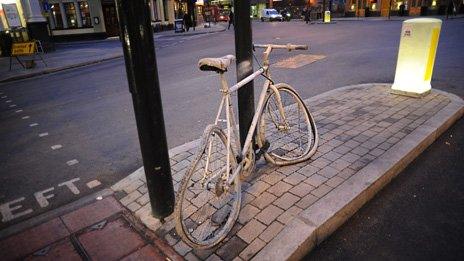
Bicycles painted white have appeared as roadside memorials to cyclists injured or killed in road collisions